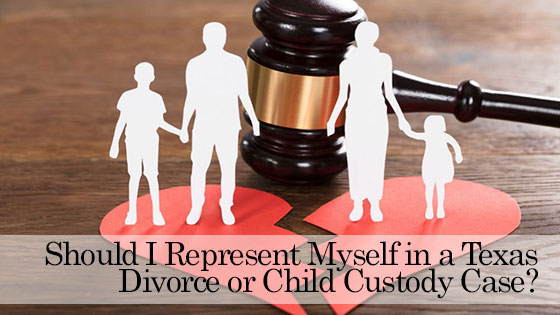Some individuals choose to represent themselves in court. It should also be known that there are many risks to representing yourself in court. The largest risk of self representation in a court case is that you may lose the case, due to your lack of legal knowledge. When you represent yourself in court, you are held to the same standards that family law attorney is held to. If you do not follow every procedure that is required by the court, your case will be dismissed and the other side may win their case. If the other side wins their case, you may be ordered to pay for their court costs and for their attorney fees. It is most common for individuals to represent themselves in small claims court, due to the fact that this is the easiest type of trial to go through without a lawyer’s advisement. It is less common for individuals to represent themselves in other types of court cases, like criminal trials, child custody cases and divorce trials.

Representing Yourself May be a Big Mistake
In the state of Texas, you have the right to represent yourself in divorce cases, although self-representation may not be the ideal option. There are many errors that can be made which may harm your case and the potential outcome of the trial. After the judge presiding over your case signs the final divorce decree, nothing may be changed regarding the property division. Further, mistakes may be made regarding child support and child custody that may be extremely difficult to change in the future.
Improper Documentation Filing
A common mistake that is made when individuals represent themselves involves not preparing the required legal documentation correctly. Legal documents must be prepared appropriately in order for them to be effective legally. Legal documentation often requires that certain language is used in order for the document to be held legally viable in a court of law. If a document does not use the required or appropriate language, the document may be thrown out and the divorce trial may be stalled or dismissed. Another common mistake in legal cases that involve individuals representing themselves is improperly serving legal documents. Many individuals who are not attorneys fail to properly serve documents related to divorce trials. A failure to serve divorce documentation in the appropriate manner can lead to the divorce being stalled and if an injunction is needed it will be ineffective.
The Discovery Process Mistakes
Typically, divorce cases will involve gathering information through a process known as the discovery process. The information collected during this process is relative to all aspects of the divorce case and can include child support, child custody, alimony, and property. If the discovery process is not done in the proper manner, it will most likely be very difficult to receive a favorable outcome during the trial. If a divorce case is not prepared in the proper manner, it may prevent the case from settling without a trial. Keep in mind that individuals who are unable to negotiate their side and lay out the proper information are usually unable to be persuasive and have the other side accept their proposal.
Experience Does Matter
Attorneys have a depth of knowledge that allows them to understand legal rules and technicalities that an individual with no legal background would consider or know about. If a person has no experience with divorce cases, they often do not have the ability to present the facts and information necessary to achieve a desirable outcome. Often, individuals who represent themselves in divorce cases present facts that are not legally relevant, do not make the correct arguments, and spend their time in court speaking about issues that do not help their overall case. If the other side has legal representation and are able to adequately present their side of the case, a judge will often rule in favor of the spouse that has a family law attorney and not the spouse who represented themselves.
Call our offices today at any of our convenient locations for a free consultation.
Arlington (817) 522-4451
Dallas (972) 362-6848
Fort Worth (817) 764-1375
Plano (972) 354-4602
Cedar Hill (972) 338-9427
McKinney (469) 522-3688
Lewisville (972) 354-4605
Frisco (972) 725-7681
Grapevine (817) 835-8677
Irving (972) 354-4610
Keller (817) 204-0904
Garland (214) 572-2251
Denton (940) 222-4060
Addison (972) 564-8108
You can also contact us online by using our quick contact form.










